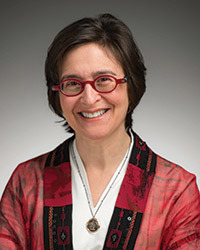 Susan Blum
Susan Blum
Susan Blum was trying hard to convince her own students — and her frustrated school-age daughter — of the benefits of modern education. It wasn’t working. So Blum, an anthropology professor who came to Notre Dame in 2000, joined her professional expertise with her personal experience to explore why so many people chafe at the classroom and curriculum.
The result is “I Love Learning; I Hate School: An Anthropology of College,” published recently by Cornell University Press.
“I loved school,” Blum explains. “I didn’t understand why students didn’t like school. I figured if I could just somehow persuade them that this is for your own good, this is fascinating, this is important— if I could convince them of that, they would somehow love school. It turns out it didn’t work that way for a lot of people.”
Anthropology offers some insights into the mismatch between how people learn in general and how the modern industrial-model educational system tries to teach them.
“Human beings are natural learners,” Blum says. “We have evolved to learn. We have to learn how to live our lives because we don’t have enough instincts to guide us. Human society is dependent on learning that is transmitted from one generation to another. In most societies for most of human history, this has been done pretty effortlessly by being integrated with people in their society.”
The vital lessons about such things as food, sex, worship and technical know-how came through observation, trial and error and occasional direction — with immediate and sometimes fatal consequences for failure to learn. By contrast, the value of algebra seems remote.
“With school, what we’re saying to students is, ‘You have to learn this,’” she says. “‘You don’t know why, but we’re telling you, you need to do this.’”
In that environment, the obvious answer to “why learn?” can become: grades. “The motivation becomes extrinsic entirely,” says Blum, whose earlier book, “My Word! Plagiarism and College Culture” (Cornell 2009), dealt with the problem of plagiarism, possibly exacerbated by the implied incentive of high grades, good college and high-paying job.
“Each of these steps is so remote from anything meaningful for life, the only use many students can see for it is to get the grade,” she says. “I call that ‘the game of school.’ It might as well be a board game — how many points can I get? It’s not about learning anything beautiful or fascinating.
“You’re being trained to learn something not for its intrinsic merit but because somebody will reward you for it. If somebody has to reward you for it, obviously you’re doing it for them, not for yourself. Education has to be for the learner. In the classroom I try really hard, but it’s usually a challenge, especially at Notre Dame where our students have thrived in the system. They wouldn’t be at Notre Dame if they hadn’t mastered the game of school.”
The system fails to tap the considerable capabilities of young people who in other times and places have assumed significant roles and responsibilities in society, from work and warfare to domestic chores and child care.
“At one point, I began to realize how incredibly competent college students are,” Blum says.

“Our students show this when they run clubs or they do sports or they coach younger kids or they’re in band or they write music. In the classroom … it seems to be tragically wasteful to have all this ability submerged so they can passively say, ‘OK, tell me what to do.’ The system creates that.”
Alternatives to such a system — which likely contributes to cheating, depression and suicide among college students — are difficult to identify. Experiential learning, such as internships and service, embed students in society, but even that risks the extrinsic motive of resumé-padding.
“I don’t have an easy answer,” Blum says. “I don’t think everybody should follow the same curriculum. I would like to see a lot more hands-on learning, a lot more integration into the world outside of school where students see what they’re learning has consequences in the world.
“You have to begin with curiosity and a thirst for learning. Our schools are not set up that way at all. The challenge is to reintegrate learning with life.”
In an interview with John Warner in Inside Higher Ed in late March, Blum was asked, if she had a magic lamp and a genie granted her three wishes, what she would change about education. Here is her answer:
“My first wish is that education would take place in the context of the actual world in which it will be used, rather than isolated from any need or application. Not deferred until someday, and not a game of school. Not even age-graded; this narrow age-grading of industrial schools impoverishes the amount of peer learning that is enabled in most societies where children learn from “near-peers.” Of course at community colleges and some universities this is less the case.
The second is that students would not enter universities and colleges straight from high school. (High schools are really problematic too, but this is Inside Higher Ed…) The conflation of growing up and academic learning makes both more problematic. It would make sense to have students set off and learn to be on their own, and then if they needed it, or wanted it, they could enroll in an academic institution. Many would find other ways of learning what they want or need, perhaps in training programs.
The third is that there would be no grades. In that way, the measure of success would have to come from elsewhere — from application, satisfaction, from how well the learning actually works. As another of my touchstones, Frank Smith, says in his wonderful “The Book of Learning and Forgetting,” most learning — aside from in school — is continuous, effortless, independent of rewards and punishments, and never forgotten. It is only in schools that learning becomes so difficult, dependent on rewards and punishments, and easily forgotten.
The changes can’t be done one at a time, because they are interconnected, and it would take real political and social will to challenge the dominant model of schooling that we have all naturalized. But there are so many experiments being done in so many different domains, that it seems clear we are ripe for a genuine revolution in learning. In that sense, perhaps students can celebrate their love of learning, which is, after all, part of the human endowment.”
Contact NDWorks at 574-631-0455 or email Carol Bradley, NDWorks editor, at bradley.7@nd.edu